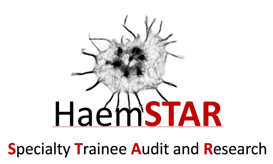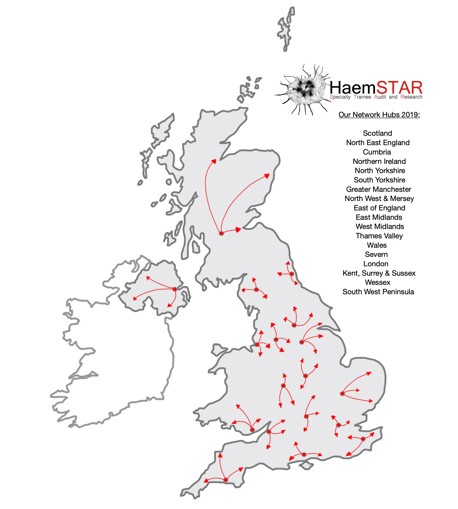We are thrilled to highlight some of the opportunities, projects, research and consultations that are currently being worked on within the wider Haematology community and beyond.
The Royal College of Physicians (RCP) is looking to recruit a new clinical adviser in flexible working, based in the Medical Workforce Unit (MWU). This post provides an exciting opportunity to support the RCP’s work and promotion of flexible working across all grades of the physician workforce.
About the role
- Start date: as soon as possible after appointment subject to their clinical commitments
- Term: Initial 3-year term, extendable to 4 years by mutual agreement
- Eligibility: Open to fellows in good standing with the RCP, your employer and the GMC. Job-share applications are welcomed, provided agreements are established between applicants prior to submission
- Commitment: Estimate 6-8 hours a month but this will be subject to workstream activities and candidate’s clinical commitment. And will be on a flexible basis throughout the year.
- Remuneration: Unrenumerated post. Eligible expenses are reimbursed in accordance with the RCP’s travel policy.
Are you a medical student, intern, or resident interested in choosing hematology as your specialty?
EHA offers mentorship and guidance to get familiar with hematology as a clinician and/or researcher. The program aims to provide you with a clearer idea of what hematology entails from a practical point of view and get a head start in the field.
More information can be found on their website.
The Royal College of Pathologists are looking for some images to help decorate their new building. Images representing haematology and also transfusion medicine/science would be gratefully received.
They are looking for very high quality images that are at least 300 dpi at 2.4 meters actual height. This is because if the images are lower quality than that they will pixelate when blown up to that large scale. Ideally the images should be abstract as this is an art installation rather than a pathology one, something colourful would be great.
If you have a suitable image please contact:
Daniel Ross, Chief Executive
The Royal College of Pathologists
Email: [email protected]
Become an NHS Ambassador and join the thousands of passionate NHS staff who are inspiring future generations to consider a career in Healthcare. Since the campaign began in 2018 our NHS Ambassadors have interacted with over 400,000 young people through Inspiring the Future.
The Royal College of Pathologists is recruiting new audit evaluators for haematology.
Applicants should be Fellows of the College, have knowledge of the clinical audit process and be experienced in undertaking high-quality clinical audit. Evaluators are responsible for evaluating whether the criteria and standards of audits for certification are met appropriately for your own specialty.
To apply please submit an abridged CV and a statement in support of your application (no more than 500 words), explaining how your skills and experience meet the person specification and how you would approach the role if appointed. For further information about the role, and to apply please contact Maria Marrero Feo via [email protected]
We are looking for haematologists and haematology CNSs who would like to volunteer to help review our cancer information. Our information is widely used by healthcare professionals and people affected by cancer across the UK.
As a professional reviewer, you can use your clinical expertise to help us make sure our cancer information is up to date and reflects current practice. We cover all haematology cancer types. You can tell us your area of expertise, and how often you want to review. This may be a few pages once or twice a year, or more if you are able. These are emailed to you as word documents.
If you would like to volunteer, please fill in our short survey to be added to our secure database. Your information will not be shared outside our team. If you have colleagues who may be interested, please feel free to forward them the survey link. If you would like more information, you can contact us on [email protected]
The Federation of the Royal Colleges of Physicians of the UK is seeking Question Writers in a variety of specialties to write questions for our MRCP(UK) Part 1 and Part 2 Written Examinations as well as our Specialty Certificate Examinations. This is a valuable opportunity to contribute to the assessment of medical knowledge and play a vital role in shaping the future generation of physicians. Upon the completion of a half day online training course, volunteers would then participate in an annual two-day hybrid Question Writing meeting at the University of Warwick in Coventry offering excellent networking opportunities, external CPD and paid expenses.
If you are interested in becoming a Question writer, please find further information (including eligibility and how to apply) here.
Join the EBMT Trainee Committee – Call for Interest Now Open!
We believe in the power of connection, collaboration, passion and curiosity.
This year, we’re having slots for new members who are ready to grow with us.
Our Mission
We aim to be a bridge between early-career haematologists across the world and opportunities in stem cell transplantation and cellular therapy. Together with the EBMT and its Working Parties, our committee nurtures education, research, and innovation in this exciting and evolving field.
Who We’re Looking For
We welcome diverse voices and fresh ideas. If you’re an early-career professional or aspirant in hematology, transplantation, or cellular therapy—whether you’re a medical student, researcher, clinician, nurse, bioinformatician, or physician-scientist -we’d love to hear from you.
You might be a great fit if you are:
● Able to contribute ideas, skills, or tools that amplify our impact
● Passionate about creating a transparent and inclusive space for growth
● Interested in building bridges across borders and disciplines
● Willing to dedicate an average of 5 hours/month to bring meaningful
projects to life and for virtual meetings every 1–2 months
How to Apply
Submit your application at link before 15 August 2025.
We welcome applicants from all countries and backgrounds. Your perspective
matters. Let’s grow, learn, and lead together!
Co-Chairs Co-Vice Chairs
Esra Gülderen Candice Hendricks
Alex Rampotas Luca Vinci
Projects, consultations and research
It has been identified that there is a gap in the process of how patients, both adult and paediatric, are consented for bone marrow aspirates and trephines. In addition, the training and accreditation process is extremely variable in different centres. This is both nationally and internationally. Under the BSH General Haematology Task force's umbrella, we have agreed a Guideline writing group to address this. We would be very grateful if you could please complete the following survey, as the information gathered will form the basis of the next step of our work.
https://docs.google.com/forms/d/e/1FAIpQLSc4dqsYz_LBD6JJFuG21CIxEL94hEzVkGCx5eAjGMFwpFMvhw/viewform
Many thanks,
Jayashree Motwani.
Consultant Paediatric Haematologist,
Birmingham Children's Hospital
Vice-Chair of the BSH Paediatric SIG.
Blastic Plasmocytoid Dendritic Cell Neoplasm (BPDCN) International Registry
We would like to ask for your contribution in the BPDCN International Registry project.
By joining our registry, you will help us:
- to create a large database of patients with BPDCN and
- to investigate the characteristics and outcome of disease with different treatment regimens,
- to evaluate prognostic factors,
- to generate data-based prospective treatment recommendations.
You can register your interest to participate using this link:
https://docs.google.com/forms/d/1uykOE9PiaCXJ-E5snP8gPXxRN7RA7r4_PULR-oAvTSg/edit?ts=63a5a605
Dr Astghik Voskanyan
We would like to ask for your contribution in the MRC funded project that is developing reporting guidelines for randomised controlled trials (RCTs) protocols and reports using surrogate primary endpoints: the SPIRIT-SURROGATE and CONSORT-SURROGATE extensions.
By taking part in our survey, you will help us to develop guidelines for reporting RCTs with surrogate primary endpoints. The survey will ask for your views on the most important items that should be reported by RCTs reports and protocols using surrogate endpoints.
We are particularly interested in the views of people who:
• have expertise or interest in surrogate endpoints with basic understanding of the concept of surrogacy in RCTs
• are implementers or end users of interventions that use surrogate endpoints (e.g., patient and public representatives, healthcare professionals)
• have expertise and are interested in RCTs reporting and methodology (e.g., researchers journal editors, statisticians, methodologists)
• are interested in the design and reporting of trials using surrogate endpoints (e.g., journal editors, funders, regulators).
You can register your interest to participate using this link: https://forms.office.com/r/1UuDCBU8bc
Many thanks,
Dr Anthony Manyara, Prof Rod Taylor, and Prof Oriana Ciani on behalf of the SPIRIT|CONSORT-SURROGATE Project Team
Dr Rachel Rosovsky is a Haematologist, based at Harvard, leading in the survey of current anticoagulation practice in the management of Covid-19 patients
The survey takes 5-10 min to tell us about if and how anticoagulation practice has changed given the publication of the multiplatform, RAPID, and HEP-Covid trials: https://redcap.partners.org/redcap/surveys/?s=HFJJ38THP4
The UK CLL forum would like clinicians to complete their CLL Covid-19 survey.
The Academic Section of Vascular Surgery at Imperial College London are conducting a survey evaluating the impact of the Acute Venous Thrombosis: Thrombus Removal with Adjunctive Catheter-Directed Thrombolysis (ATTRACT) Trial on clinical practice.
They would be grateful if you could spare 3 to 5 minutes to share your experience.
Please direct any questions or comments regarding the questionnaire to Aleksandra Staniszewska at [email protected].
The NCRI MDS subgroup, UK MDS Forum and MDS UK patient support group have created a survey for MDS and AML patients and caregivers to complete regarding their management during the COVID-19 pandemic.
The aim of this is to understand more about patients’ perspectives of the changes to their care that took place since the pandemic and also to gain some insight into their own experiences of COVID-19 if applicable.
They hope to use the data to better inform them about any beneficial changes to practice that they can take forward to improve the care of MDS and AML patients and also to understand what barriers and difficulties patients came across during this period.
Please pass this link on to your patients and their caregivers so that they can have their say: https://www.surveymonkey.co.uk/r/MDSUKCovid19surveyCL

About HaemSTAR
HaemSTAR is a national network of haematology registrars aiming to promote and create research in non-malignant haematology. One of the areas we promote is audit.
There is often difficulty in recruiting patients to audits for non-malignant disease, either due to reduced investment into projects relative to malignant haematology audits, or because of the rarity of conditions such as TTP.
The aim of HaemSTAR is to use a central committee to either create non-malignant audits, or to promote audits started in trusts around the country to enhance uptake.
The committee then disseminate information about these studies to regional leads in each training region. These regional leads then disseminate that information to their registrar colleagues. This allows potentially for every haematology registrar nationally, and subsequently their consultants, to be informed about these projects, hugely increasing potential project recruitment.
We have very positive data from the projects we have completed so far, including an audit of IVIG use in ITP which accrued 975 patients in 39 centres nationally.
The benefits for those who registrars or consultants who contribute is that audit proformas and registration information for audit departments are prepared for them, their data is analysed for them and that they can achieve ‘citable collaborator’ status if they have given sufficient contribution on any papers published from those audits.
Further information can be found on our website; www.haemstar.org or by contacting [email protected]. This can be useful for consultants in hospitals with no registrar presence so they can receive our monthly Newsletter which explains our current projects.


